Archive for the 'Technology' Category
HOWTO: Convert any video format to any video format (snippets)
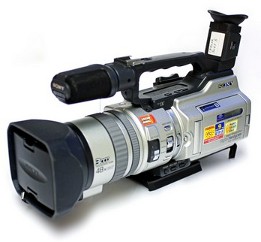
UPDATED: 2010-4-8 to include rotating video.
I’ve recently started creating some screencasting tutorials with my Linux laptop using recordMyDesktop and find myself having to convert the video to various other formats before I can share it with my Windows colleagues, or upload it to YouTube.
I’ve done some of this before for converting video for use on my BlackBerry over here and converting video for my iPod over here.
Here’s are the snippets all in one place (using mencoder, but you could also use ffmpeg). Hopefully these will be useful to others as well.
Some of the lines below are quite long; make sure you unwrap them all on one line when you run the one you need.
Enjoy!
Read the rest of this entry »
What to Buy Your Geek for the Holidays: A Black Friday Post-Mortem
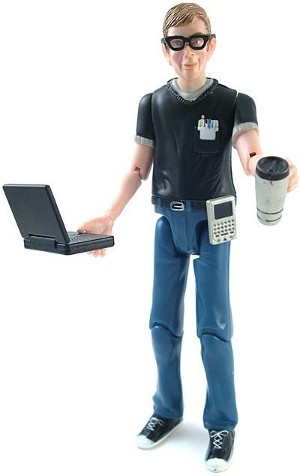 It’s that time of year again. The time of year when everyone rushes out to the malls and stores, to push and pull everything off of the shelves, to strip stores bare, in search of that “door-buster” deal of the day. There’s thousands of stores, genres, clothes, tools, toys and gadgets out there for everyone.
It’s that time of year again. The time of year when everyone rushes out to the malls and stores, to push and pull everything off of the shelves, to strip stores bare, in search of that “door-buster” deal of the day. There’s thousands of stores, genres, clothes, tools, toys and gadgets out there for everyone.
But what do you get your geek for the holiday? How do you please the geek who already has everything?
The first thing you want to identify, is how much are you willing to spend (or not spend) to make your geek smile over the holidays? Gadgets, gear and goodies can range wildly in price, even for the same item. Some things you can get for 1/2 the price depending on where you purchase it.
Also, not everything requires you to pay for it. There are plenty of places where you can get some free gear for your geek, without spending a dime on it. Check your local Freecycle group or CraigsList free postings. You can also find some really amazing deals at woot!.
The second important point is to determine what kind of geek he/she is. Are they a music or band geek? A math geek? A science geek? A computer geek? Or all of the above.
Ok, once you’ve got that figured out, let’s get right into it…
The Don’t
- DO NOT buy them computers, software, or peripheralsWhy, you ask? Because most geeks already have the computers they want or need, and software is such a complicated decision (with much of it being freely downloadable anyway). Is it supported on your geek’s operating system? patch level? hardware?
Peripherals are such a personal choice too. Does your geek prefer a corded or cordless mouse? clicky or silent keyboard? standalone or integrated webcam?
Chances are that unless you know your geek very well, whatever you get in this category will likely be a.) incompatible, b.) something they already have, or c.) something they don’t want or can’t use.
- DO NOT buy them technology booksI know, this seems counter-intuitive, but most geeks already have the technical books they want, and the rest they can probably get somewhere online through O’Reilly Safari Bookshelf, Google Books or similar places.
Most HOWTO docs for programming languages are already online, as well as Usenet groups, mailing lists and helpful forums on every language imaginable (for example: Tech Books for Free, Computer Books Online and the Baen Free Library).
If a geek wants books, they usually want things like sci-fi, autobiographies or books on subjects like robotics or similar. They probably do not want another book on another programming language they’re learning. Books like Neuromancer, Ender’s Game or Hyperspace are examples of the type any geek would cherish. Check NerdBooks or this large list for some ideas for books for your geek.
If you’re not sure, take a look at your geek’s bookshelf first (if they have one), or take a peek at their existing book collection and see what they like or do not like.
- DO NOT buy them phones or PDAsUnless they ask for a specific model or type, don’t buy your geek a smartphone or PDA device. Chances are they already have the best unit for their specific tastes, and anything else would probably be sub-par. Avoid the temptation, and just get them an accessory for their current model phone, or a spare battery. I’ve amassed quite an enormous collection of PDAs and smartphones myself (yes, that really is my personal collection, as of late 2006).
The Do
- DO buy them clothesAll geeks need clothes. Lots of clothes. Mostly t-shirts. Lots and lots of t-shirts. The geekier the better!
All kidding aside, our t-shirts are our “uniform” for the geek. It helps define us when we’re in a sea of “normal” people in public. It’s also a beacon to other geeks who seek out one of their own “kind” in the same crowded public spaces. Some great places to shop for geek t-shirts are Jinx, Geeklabel, NerdyShirts and of course… ThinkGeek.
- DO buy them storageAll geeks need storage and a place to put their digital “stuff”. The bigger the better (for capacity), but the smaller the better (for space savings; in-pocket or in-bag). Best (and cheapest) places to buy storage are at NewEgg, TigerDirect and Geeks.com.
Large storage is just one piece. Let’s not forget the smaller stuff; media cards for all of those gadgets and devices. USB thumbdrives, memory cards (CF, mmc, SD, microSD, oh my!). Check NewEgg and Amazon for those too.
- DO buy them games for their gaming system of choice (or upgrade their current system to a new version/model)All geeks like to entertain themselves with a little gaming now and then. Some go for the historical games and military first-person shooters, while others like puzzle and strategy games. The trick here, is finding one your geek a.) doesn’t already have, b.) hasn’t played before, and c.) will enjoy.
Sneak a peek at his/her current game collection, write the titles down, and take it to your local game store. The staff at most of these stores are very hip to the trends, and they can recommend games that will fit perfectly with your geek’s style. Many stores also sell “gently used” games a a deeply-discounted price, which can help if your geek beats the game in the first 48 hours of owning it!
BestBuy has a really broad selection of games for most of the gaming systems out there: PS3, XBox, Wii and others. Also check GameSpot and EB Games online or in your local mall for more games and deals.
- DO buy them a magazine subscription or threeThere are literally hundreds of Technology, Geek and Nerdy magazines out there on every topic and genre. Hit your local Borders Books or Barnes and Noble, walk through their magazine section and pull the reply card out of the magazines you think your geek would like, and sign them up.
If you don’t want to do that, just write the name of the mag down and go online later and sign them up for a subscription. Not only will it be new and exciting every month, but there are valuable articles, tips, tricks and references in every issue.
Gift cards are also nice, though they should be used as a last resort. Gift cards to your local book store or even to the iTunes Gift Card to buy movies or music on iTunes can be one of your last-minute stocking stuffers.
If you’re still not sure what to get your geek for the holidays, just ask, and let them tell you. We may be very particular, but we don’t bite.
Good luck!
2008, the best year in decades
2008 has been one of the best years ever… in so many ways. So much has changed and changed me, to push me further and faster forward. I don’t think I’ve felt this good, this motivated or this happy about where I am in at least 20 years.
- I’ve finally released myself from the shackles of my marriage after spending 3 years and ~$40k slogging it through the courts to keep my daughter in my life. I was with my girlfriend-then-wife for 8 years, and realized over time that she wasn’t the person I married. I also refuse to tolerate adultery in my marriage, so I ended it. Being single and alone for over 3 years is tough, but not a permanent problem.
- I’ve created a bond with my daughter that transcends words and sign language. She’s coming into her own and is learning some new abilities to “talk” and “listen” without using words or traditional language as we know it. She’s a beautiful, amazing little girl with an eye-opening list of skills and abilities, even at her tender age. Sure, life as a single father is difficult and challenging, but I’ll sacrifice whatever I need to, for her to grow up happy, healthy and reaching any goal she wants for herself.
- I’ve met some interesting and amazing people this year, some of which who have shown me facets of myself that long lay dormant, atrophied or discarded as unreachable anymore. The good, bad and ugly were all on display this year. Michele, Marci, Jennifer, Valerie, Lilibeth, Amy, Allena, Rachel, Pat & Lisa, Casey and the rest of the Edwards family and many others; you all know who you are, and in some small and large ways, you’ve made a permanent impact on my life. The genie is out of the bottle, and isn’t going back in.
- I work with a great group of people in Manhattan, doing some really cool things with technology and environments that I’ve worked with and supported for 15+ years. I wouldn’t give this up for the world at any price. I truly love what I do. I do what I do for free, I just collect a salary to pay for all of the things I don’t necessarily like doing. Ed, Phil, Dennis and others; let’s hope the fun can continue through 2009 as it did in 2008.
- After 16 years of searching inside my head for the lost memories from the first 20 years of my life, I’ve recovered what I believe to be more than half of them, all in the last 10 months or less. Remembering “other people’s” memories is a bit disconcerting, but it’s all part of the process. There’s plenty more work to be done, but after believing that bad car accident in 1992 permanently robbed me of those memories, I now know I can get back those years and begin recovering who I was, and what made me who I am today. Not only have those memories come flooding back, but I’m also able to retain thousands of bits of information at what seems to be a geometric rate, bordering on eidetic. It’s like my brain went from knowing nothing, to limitlessly absorbing everything.
There’s a lot more work to do in 2009 and years beyond, but I have no doubt I’ll be able to step up to any challenge that life throws at me. I’ve survived horrible accidents, sadness, strife and plight in all manner of ways, and I’ve always come through on top, always looking ahead, never behind.
I feel as if a huge weight was lifted from my shoulders and the metaphorical “smog” I was breathing, impeding my oxygen flow is now gone. I can stand tall, inhale clean, fresh air and move forward again.
I’m coming out of a 16-year coma and I’m just waking up.
The Eternal Value of Privacy, an essay by Bruce Schneier
This is a couple of years old, but bears repeating here in-full. With the recent news that travelers’ laptops and effects may be indefinitely detained at the border, the issue of our basic human right to privacy rears its head again.
“Federal agents may take a traveler’s laptop or other electronic device to an off-site location for an unspecified period of time without any suspicion of wrongdoing, as part of border search policies the Department of Homeland Security recently disclosed.
Also, officials may share copies of the laptop’s contents with other agencies and private entities for language translation, data decryption or other reasons, according to the policies, dated July 16 and issued by two DHS agencies, U.S. Customs and Border Protection and U.S. Immigration and Customs Enforcement.”
Original essay from Bruce follows:
The Eternal Value of Privacy
Bruce Schneier Email 05.18.06The most common retort against privacy advocates — by those in favor of ID checks, cameras, databases, data mining and other wholesale surveillance measures — is this line: “If you aren’t doing anything wrong, what do you have to hide?”
Some clever answers: “If I’m not doing anything wrong, then you have no cause to watch me.” “Because the government gets to define what’s wrong, and they keep changing the definition.” “Because you might do something wrong with my information.” My problem with quips like these — as right as they are — is that they accept the premise that privacy is about hiding a wrong. It’s not. Privacy is an inherent human right, and a requirement for maintaining the human condition with dignity and respect.
Two proverbs say it best: Quis custodiet custodes ipsos? (“Who watches the watchers?”) and “Absolute power corrupts absolutely.”
Cardinal Richelieu understood the value of surveillance when he famously said, “If one would give me six lines written by the hand of the most honest man, I would find something in them to have him hanged.” Watch someone long enough, and you’ll find something to arrest — or just blackmail — with. Privacy is important because without it, surveillance information will be abused: to peep, to sell to marketers and to spy on political enemies — whoever they happen to be at the time.
Privacy protects us from abuses by those in power, even if we’re doing nothing wrong at the time of surveillance.
We do nothing wrong when we make love or go to the bathroom. We are not deliberately hiding anything when we seek out private places for reflection or conversation. We keep private journals, sing in the privacy of the shower, and write letters to secret lovers and then burn them. Privacy is a basic human need.
A future in which privacy would face constant assault was so alien to the framers of the Constitution that it never occurred to them to call out privacy as an explicit right. Privacy was inherent to the nobility of their being and their cause. Of course being watched in your own home was unreasonable. Watching at all was an act so unseemly as to be inconceivable among gentlemen in their day. You watched convicted criminals, not free citizens. You ruled your own home. It’s intrinsic to the concept of liberty.
For if we are observed in all matters, we are constantly under threat of correction, judgment, criticism, even plagiarism of our own uniqueness. We become children, fettered under watchful eyes, constantly fearful that — either now or in the uncertain future — patterns we leave behind will be brought back to implicate us, by whatever authority has now become focused upon our once-private and innocent acts. We lose our individuality, because everything we do is observable and recordable.
How many of us have paused during conversation in the past four-and-a-half years, suddenly aware that we might be eavesdropped on? Probably it was a phone conversation, although maybe it was an e-mail or instant-message exchange or a conversation in a public place. Maybe the topic was terrorism, or politics, or Islam. We stop suddenly, momentarily afraid that our words might be taken out of context, then we laugh at our paranoia and go on. But our demeanor has changed, and our words are subtly altered.
This is the loss of freedom we face when our privacy is taken from us. This is life in former East Germany, or life in Saddam Hussein’s Iraq. And it’s our future as we allow an ever-intrusive eye into our personal, private lives.
Too many wrongly characterize the debate as “security versus privacy.” The real choice is liberty versus control. Tyranny, whether it arises under threat of foreign physical attack or under constant domestic authoritative scrutiny, is still tyranny. Liberty requires security without intrusion, security plus privacy. Widespread police surveillance is the very definition of a police state. And that’s why we should champion privacy even when we have nothing to hide.
AT&T charges customers more to pay with cash
Tags: ircI thought it was a joke when someone spoke about this in IRC, until I Googled around and found the actual story. Shocking!
Rhonda Payne went to an AT&T Wireless store in Calhoun, Ga., recently to pay her phone bill in cash. She’d been hit by ID theft and was forced to close her checking account, so she was worried she wouldn’t be able to mail a check on time. But when she arrived at the store, she was in for a surprise.
Paying in person, she was told, costs extra — $2 extra.
Payne objected to the “administrative charge” that was added to her bill but got no sympathy. Instead, she said, she was told she should consider herself lucky because the fee was about to go up to $5.
“I was told that it was a courtesy to take cash” she said. I said, “Are you kidding me?”
It’s no joke. Beginning earlier this year, AT&T Wireless began to charge customers who pay their bills in their stores.
“It is a way of saving money … it helps us keep our costs lower,” said AT&T spokesman Mark Siegel. “We want our associates to spend their time helping customers as they are thinking about their wireless plans or looking at phones.”
Since when was it a penalty to use REAL cash to pay your bills? What about people who don’t have a bank account (and the number is growing, as the economy crumbles down). What about people who can’t pay electronically? What then?
I can’t help but think this is also related to the fairly recent advertisements from VISA Check Card where they make it seem like paying with real cash is embarrassing, annoying, slow, etc.
In fact, as the commercial below shows… all this industry wants to see is cash flowing in, as fast and efficient as possible, with as few interruptions as possible. If you pay in cash, people groan at you, look at you funny, and make you feel like you’re some sort of outcast.
If you haven’t seen The Zeitgeist Movie yet, please take the time to watch it. You can watch it online, download a copy or purchase the DVD version for yourself or your friends.
It goes through exactly why we’re seeing this shift away from physical money, and how it’s happening at very subtle, almost imperceptible levels in all facets of our society.
I STRONGLY recommend watching it, and passing the knowledge you glean from it on to others who might want to know more.
When all of our cash transactions are digital, when all money is digital and no longer physical, you can be monitored in ways you’ve never even thought of before. Not only that, but your ability to transact business in the world can now be shut off in one keystroke.
BAM!
No more groceries.
No more gas.
No more airline flights.
Nothing.
Accidentally have the same last name as someone else on a list you can’t get yourself removed from? Oops, now your life is literally turned off.
Perhaps Morpheus wasn’t so far off after all… maybe in the eyes of the current government we’re a lot closer to these than we think.
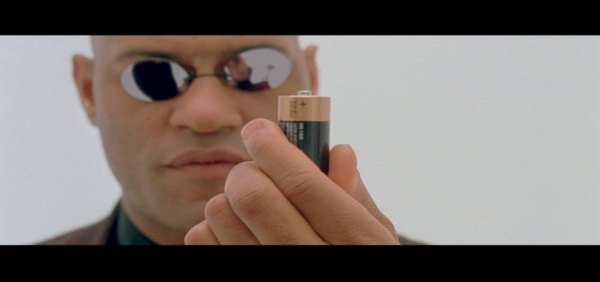
Reducing the wallet bulk on the “Road to More Productivity”
I commute a fair distance to work during the week (275 miles round-trip). I love my commute and I love my job, but commuting that far means I need to carry some significant gear with me to work on the trains and in the train stations when my rides are delayed for any reason.
In that quest, I’ve been trying to eliminate the amount of things I carry, pare down my gadgets to using only one wire to the wall and so on.
I started looking at the things I carry on my person recently; keys, wallet, change, phone and other miscellaneous items, and stumbled upon “Just One Club Card“.
Just One Club Card is a site that has one purpose; to generate a multi-barcode, 2-sided card that you can use to consolidate up to 8 other cards onto one card you can carry with you in your wallet, instead of 8 cards.
(I’m very-much paranoid about security as well, but in this case, I think the FAQ on the site dispels some of the fear, and frankly I don’t care if someone is tracking how many ties or shirts I buy from Men’s Wearhouse or paper from Staples every month.)
I just used their tool to generate a single, double-sided card that eliminated 7 of my “club” cards from my wallet, reducing my bulky, back-pocket wallet by roughly 3/8 of an inch. I also removed my library card and a recently expired health insurance card, which decreased the bulk and weight even further.
Here’s an example of the output it created (slightly modified by me, for rounded corners and other smallish tweaks and obviously obscured barcodes).
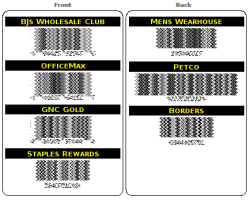
I printed this on HP Glossy Photo Paper @1200dpi, cut it out and sandwiched it between two high-quality sheets of laminate paper to make it bonded and thick/durable enough to last the war in my wallet.
There is even a nice little template for a sleeve to hold the card that has a cutout window, so only the relevant barcode can be shown, so you don’t confuse the barcode scanners when you use your card.
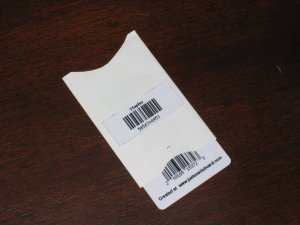
Now the next question is… will you confuse the clerk who asks for your club card? That’ll be the real test.
Here’s the results of the final product:
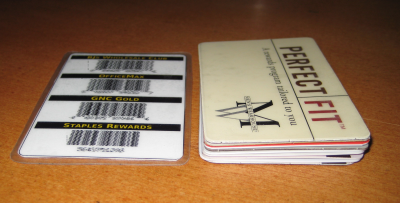
The other benefit of this of course, is that you will no longer have back pain from carrying a fat wallet in your pocket. You won’t need to go to a chiropractor because you sit lopsided on a thick wallet all day long, while you drive, in the office and so on.
I’ve already noticed a difference myself.
The 4 D’s of Inputs and Productivity
Tags: productivityIn previous posts, I’ve talked about using David Allen’s GTD system of productivity. I was turned onto this about 3 years ago and have read and listened to everything I could about the system, including joining several mailing lists about using digital tools for GTD, analogue tools for GTD, and how to incorporate using my Palm device with GTD.
As with anything I want to learn, I research and absorb quite literally everything I can get my hands on.
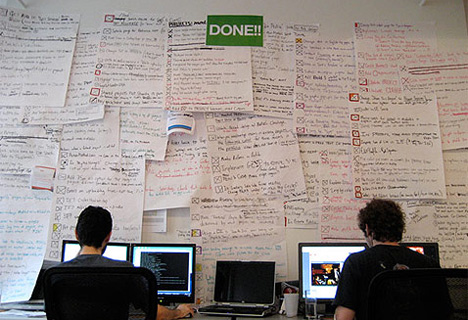
The basic premise of David’s system is broken down into the following steps:
- Dump your head into a trusted system. This means dump EVERYTHING, literally empty your head of all of those nagging “chattering monkey” thoughts inside your head. The “Call the dentist” mental reminders to the “Work on the presentation for next month” to the “Retire in 25 years”. Get it out of your head onto anything you can trust to hold it.
- Process your inputs efficiently. This one item alone could take hundreds of pages for me to explain, but basically you want to be much more efficient about how you deal with the various inputs in your day; email, phone calls, in-person meetings… anything. I’ll touch on this in a moment, I’ve taken this step off on its own tangent in my hybrid system.
- Review everything on a regular basis. David prefers doing a weekly review, and that is the core of the system, a regular, structured, do-not-ever-skip-it review every Friday. This is very important, and I strongly urge everyone hoping to follow the system to adhere to this if nothing else.
Obviously there’s a lot more involved here, but let me show you how I personally go through some inputs using David’s system, and then how I have modified those with my own hybrid system.
First and foremost, dump everything on paper.
Do not sort.
Do not categorize.
Do not keep some things in your head and some on paper.
Dump it ALL on paper, from shopping lists to phone call reminders to everything at all in your head.
Did you just feel something? Look, your head is empty, you don’t need to constantly “remember” what you were supposed to get at the supermarket. Do you know why? Because it’s on paper! Refer to that, get your shopping done, and scratch that item out when complete. Move onto the next item.
There’s a tangent here about “contexts”, where David stresses moving things into @Office, @Computer, @Phone and so on. I personally don’t believe in contexts given the nature of my own work and lifestyle, but they do work for a majority of people.
Basically contexts boils down to sorting your list-of-things into genres that make sense for that context. So “pick up milk”, wouldn’t be in the @Office context, because you can’t pick up milk while in the office. Likewise, you can’t do “performance review paperwork” while in the car driving home from work, but you CAN do your @Phone calls from there.
In my case, I’ve morphed David’s system with one by Julie Morgenstern and my own personal needs. I’ll use email as one example:
I have 6 email accounts that I use on a regular basis. I am able to see and use 5 of these in one mail client, and the last one requires logging into the VPN at work and using Microsoft Outlook over an RDP connection. It’s not perfect, but I can’t change that.
When I receive an email, there are 3 possible things I can do with it:
- Read and delete.
- Read and respond/forward (delegate), then delete.
- Read and archive out of the Inbox.
That’s it. I don’t let anything linger in my Inbox, and I don’t clutter sub-folders with lots of mail I know I need to go back and re-read later. Also, unless it’s in the “Archive” folders, I NEVER touch an email more than once.
My Inbox at the end of every day, is ZERO. On very busy days, it is absolutely above the fold. I never want to have to ever see or use a scrollbar to read email in my Inbox.
Phone calls are handled similarly. If I am on the phone, I have a pad near me to take notes, as necessary. If I need to do some action based on the call such as “Set up a meeting with …” or “Call John about presentation …”, I put that into my calendar, or my PDA or my Globe-Weis filer (more on this in a moment).
Here is the secret sauce to my hybrid system: EVERY SINGLE INPUT I receive, is one of 4 things:
- Do
- Delegate
- Defer
- * Delete
The last one has a * because it isn’t always applicable to every situation, but it does apply to email and phone calls.
When I check my voicemail, I have that same pad with me… I either:
- Listen to the calls and delete them if they are unnecessary, or
- Write notes to capture information from the call. This information can include:
- Calling someone else or capturing a phone number for reference
- Other information (dates, times, meetings, and so on).
Then I delete the voicemail. Like emails, there is no reason to “archive” and listen to a voicemail more than once… (unless of course, it’s my daughter calling to wish me a good night sleep)
If something takes less than 2 minutes to do, I just do it, whether that’s replying to an email, returning a phone call or anything else.
When I’m sitting in the train station waiting for my next train to go out, I’m clearing my voicemail, returning any open calls that I need to make, and capturing notes to expand upon later when I’m either in my office, on my laptop or in a place that has the other tools I need to complete that task.
I see hundreds of people sitting there in the station drinking their coffee staring at the Departure board, waiting for their train. Those same people then board the train, take out their laptops and work until 7:30, 8pm at night on the train.
For these people, their job bleeds over into their personal life because they lack the tools and discipline to get things done much more efficiently, and use their time appropriately.
Two of the most-important tools I carry with me, besides my notepad and PDA, are two Globe-Weis expandable filers. One of these is an A-Z filer, which I use to file things like receipts, paperwork, bills and other information that I need to access later, but which has no date or deadline associated with it. That last caveat is important.
The second expandable filer is one that is numbered 1-31/Jan-Dec. This is a part of the system that 43 Folders is named for (1-31(31) + Jan-Dec(12) = 43).
I use this second filer for everything that HAS a date associated with it. For example, let’s say I get a reminder card in the postal email that my cat’s regular, yearly vet checkup is due, and to call the office to schedule an appointment. There is no specific date, but I know it’s due in a month or so. I’ll stick the reminder card in a weekday slot for that month, 2 weeks before the appointment time, along with a post-it note stuck to the reminder card to call the vet to schedule the appointment.
Every day when I start my work, I open the filer to THAT DAY’s number, pull out anything and everything that is in there, and process through it all one item at a time, until it is empty. I don’t start my day by jumping into my email Inbox and getting distracted there. Once my filer is empty for that day, I begin processing inputs for other items (email, voicemails and so on).
Anything I don’t finish THAT DAY gets put into the next day’s slot in the filer, and the work starts all over again.
On Friday, I’ll take whatever is in Friday’s slot, process as much as I can, and begin sorting the remaining items into the next week’s slots. I know that every day when I start my day, I open that filer to that day, and work through anything that is in there.
If I have something that is due in a month, I’ll put it in that numbered day in the filer.
If I know something is due in July, I’ll stick it in the July tab of the folder. When I begin each month, I take whatever might be in the tab labeled for the month, and sort it into the numbered tabs for each day.
These two tools alone, have exponentially jumped my productivity. I no longer have to “remember” who to call on Wednesday. I know that when Wednesday April 9th rolls around, I open the tab numbered ‘9’ in the filer, and there will be a post-it or note inside saying “Call John” with his telephone number attached.
The core of the “hybrid” system is to whittle down everything possible into the lowest common task, which can be done without any thought at that moment. All of the thought to complete that task was done previously, by you, to get it to that point. David Allen calls this “cranking widgets”. You want to break your projects and down into the smallest pieces, so all you do to complete your work is “crank widgets”.
There’s a lot more useful nuggets in using the “hybrid” system and I’ll continue to expand on this in future posts. Stay tuned!
What Is Going On With AdSense Earnings?
Tags: beta“The trouble is that AdSense is a chaotic and complicated system, and we are all trying to make sense of it with a lot of missing information.”
Keep that quote in mind if you’re an AdSense publisher.
AdSense is a complicated system. It is also a black box. What we see through our AdSense reports, is exactly what we’re allowed to see. There’s a lot of complexity behind the system that Google does not want you to see. This is precisely why it is a violation of the AdSense TOS, to share your specific earnings amounts, percentages and such… because collecting that information over time, would allow someone to discover their weighting, their algorithms and their methods.
Read the rest of this entry »
The Ramblings of SEO and SEO 2.0
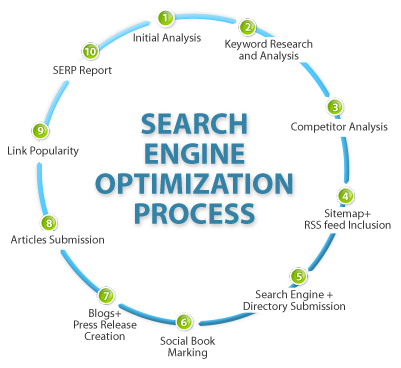 There’s a lot of fraud happening on the Internet. Everyone already knows this.
There’s a lot of fraud happening on the Internet. Everyone already knows this.
But there’s a rising frequency of people advertising themselves as “experts” in the field of SEO, or “Search Engine Optimization“, who are there for no other purpose than to confuse, mislead and trick people into handing over their cash for the hope of having their websites show up higher in the Google rankings.
I’ve had cold-calls at the office number here, from people advertising that they can bring my website up in the rankings. Mind you, the websites I run are already PR6 and PR7 (PR is an SEO acronym for Page Rank). Bringing these websites up from their current ranking, would be VERY difficult for anyone to do. CNN’s website for example, is a PR9 website, and it would take a lot of work to get my sites up another notch or two to PR9.
But there are some true experts out here among the masses. And there are a lot of tools out there that are pretty useful. One of the tools I’ve been using for a couple of years to help my own website development, is the “Auto Keyword Generator” written by Chris Green at WebCreationz.
The tool is hosted in England, and from my location, it got to be a bit slower than I would have preferred. No fault of Chris or anything else, just distance and latency.
So I decided to rewrite it, and add some additional features. I’ve called it the “SEO Auto Keyword Generator“, and after using it to help a few new websites I’ve launched over the last week (with over 1,000 separate, high-quality articles of content, each with their own keyword matrix), I decided it was time to let others use it as well.
Everyone can do SEO, its not magical or voodoo.
The next step, which will be the hardest for most of these fraudsters to accept, is that SEO 2.0, the next wave of SEO, has absolutely nothing to do with keywords, MFA sites, stuffing content, autoblogging, or any of the other garbage whitehat and blackhat tricks they use to try to trick people into clicking on their ads or buying the sham products they’re selling.
“Definition of MFA: Made-for-advertising page. A broad class of generated webpages whose real purpose is to draw visitor traffic in the hopes people will click on the banner and link ads from Yahoo!, Google, or whomever else they partner with. MFA sites rarely have unique, original content, and exist solely to duplicate other content with the intent to make money on other people’s work.”
SEO 2.0 is about the content, about the quality, and about keeping users interested in reading it, and coming back for more.
If you know how to write original, quality content, market and promote it properly, your site will do fine… and that’s what it is all about. My PR6 and PR7 sites have been around for 7 years, with ZERO promotion or “traditional” SEO done to them, and they do fine. One of them has over 11,000 unique, organic backlinks.
It’s all about the content. The quality. Stick with that, and you’ll do fine.
Thanks, gratitude and CSS
use strict;
use CGI qw/:standard start_diary end_diary/;
use Env;
print start_diary();thomasvs: Thanks for the automake help the other day. It’s all voodoo to me, but I’m picking it up slowly.
movement: Thanks for giving me a hand with oprofile on Monday. I still haven’t tracked down those bugs we discussed. I’m also tinkering with valgrind. Very useful tool. I highly recommend it to anyone who wants to
squeeze out the last of the bugs in their code.
I’ve also found lots of the fellow monks at PerlMonks.org to be incredibly useful lately. I’m running into very weird Perl issues the deeper I get into some code I’m working on. Lots of helpful folk there.
Also, I must give credit to Dorward and tomg on Efnet’s #html channel. They are very strict HTML/CSS purists
like myself. Birds of a feather, I guess. They’re also keeping me in line with some of my code.
The new Plucker website layout is coming along very well. It validates as XHTML 1.0 Transitional, the CSS is 100% validated in two separate parsers, and it works in 11 browsers. No tables, nothing fancy in the formatting, all CSS. The only browser that seems to have problems at all is Konqueror. To date, it is the least compliant as far as CSS goes. Horrible results.
print end_diary();